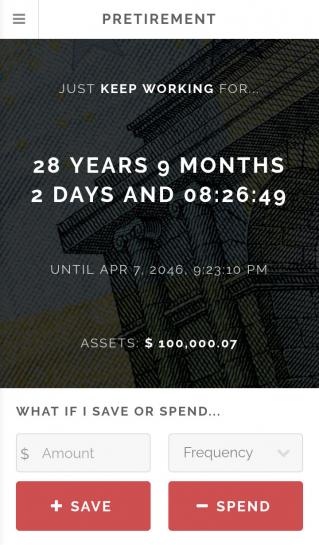Your Money: Will a countdown clock to retirement help you save?

If you knew that buying a daily $4 cup of coffee would delay your retirement and make you work exactly four months, 17 days and 9 hours longer, would that finally entice you to skip it?
NEW YORK (Reuters) – If you knew that buying a daily $4 cup of coffee would delay your retirement and make you work exactly four months, 17 days and 9 hours longer, would that finally entice you to skip it?
Visualizing the time left until retirement and seeing how certain spending habits affect your goal are the purpose of the new Pretirement app. pretirement.amokrunner.com
“When we are saving money, it’s not obvious that you can’t buy something,” said Danny Murphy, the app’s designer.
Pretirement asks for basic retirement parameters: how much you already have saved, how much more you plan to save on an annual basis and how much you think you will spend when you are retired. Then it calculates how long you will have to keep working to generate the income you say you will need when you retire – down to the seconds, which keep ticking away.
The app uses default assumptions about your investment growth rate, inflation and a safe withdrawal rate of 4 percent, which you can change if you wish.
With additional input, Pretirement will also tell you how much more or less time you will need if you spend more or save more. You can keep adding and subtracting until you get a time frame that pleases you.
Reuters spoke with Murphy, a 32-year-old civil engineer from Auburn, California, about the challenges of using dynamic visualization to try to change behavior.
Q: What is your own time horizon for retiring?
A: I’m on a 17-to-20-year horizon.
I really should use the term financial independence rather than retiring. I have no real intention of retiring early. But I want the option to functionally retire.
It would mean that working would be entirely because I wanted to do it rather than that I had to do it. I have no complaints with my job, but I love the idea of being free to make decisions when I want to make them.
Q: What kind of feedback have you been getting about the countdown aspect?
A: The number one response is: “That sounds depressing.” They don’t want to know.
And the other thing that has been enlightening is how many people I’ve had demo it have no idea what they have in the bank and what their potential costs are, what interest rates are. The general public hasn’t had a lot of insight into their financial picture.
One person said: ‘Unfortunately, I’m not going to be able to retire until I’m 92.’
Q: What is your ideal scenario of how this app can help?
A: I hope that people get a better grasp on the little things. It’s one thing to spend the time to crunch the numbers when you are buying a new car, but it’s the small things, like a music service subscription for $12 a month, that provide significant difference.
Some have small benefit to you – instantaneous, like a cup of coffee – but are really costly long-term.
Q: Has your own behavior changed since learning how your spending affects your goals?
A: The biggest thing we’ve done differently is cooking more at home and eat out less often. Food is our second-biggest expense.
 0 comments
0 comments




